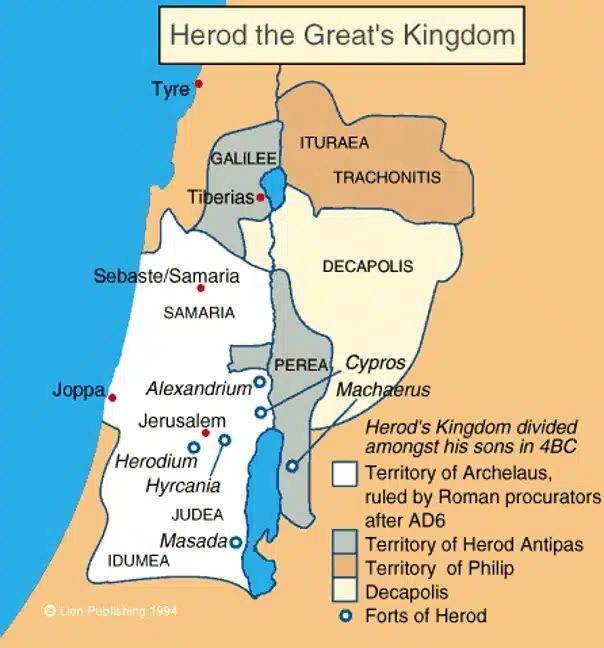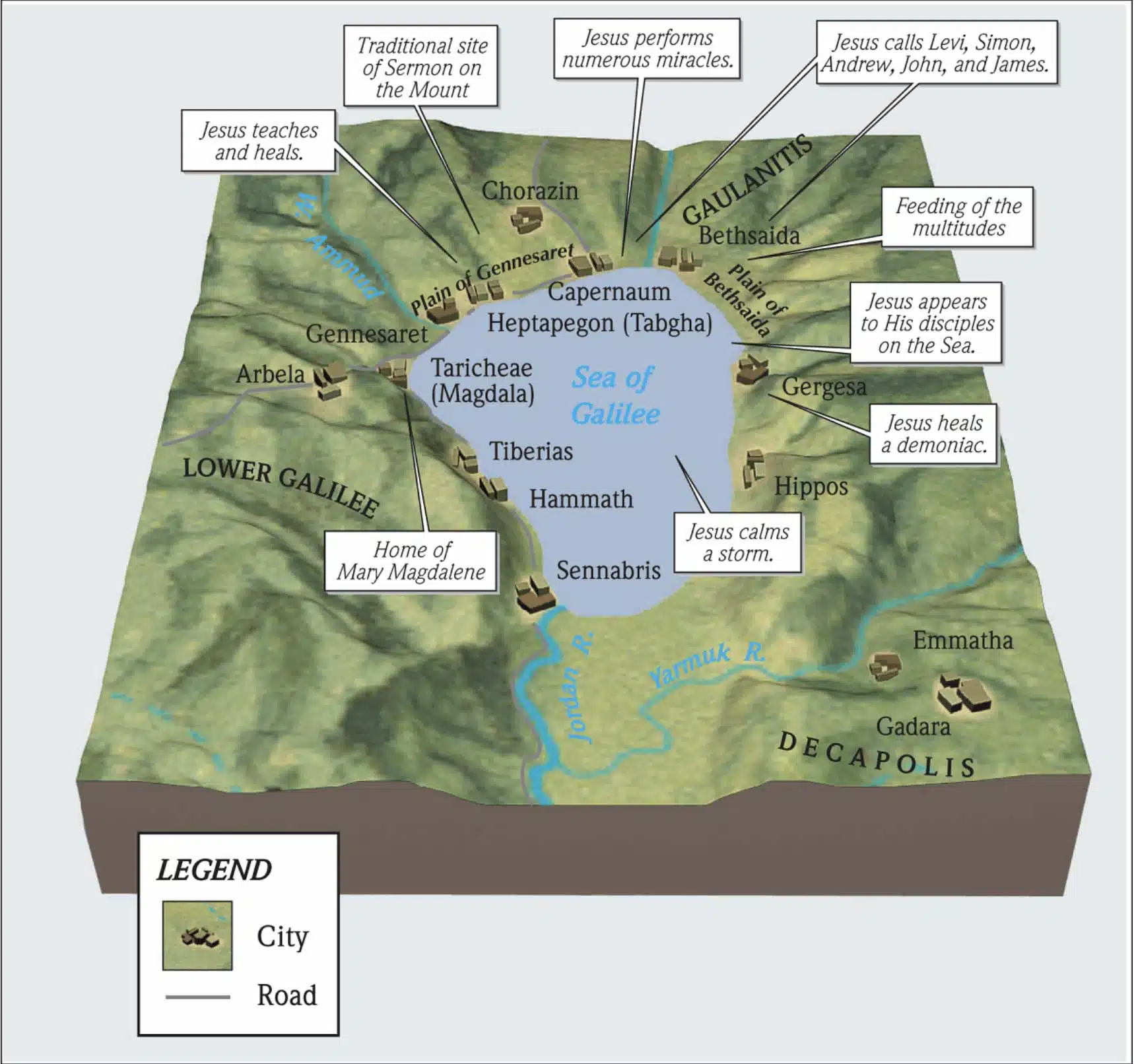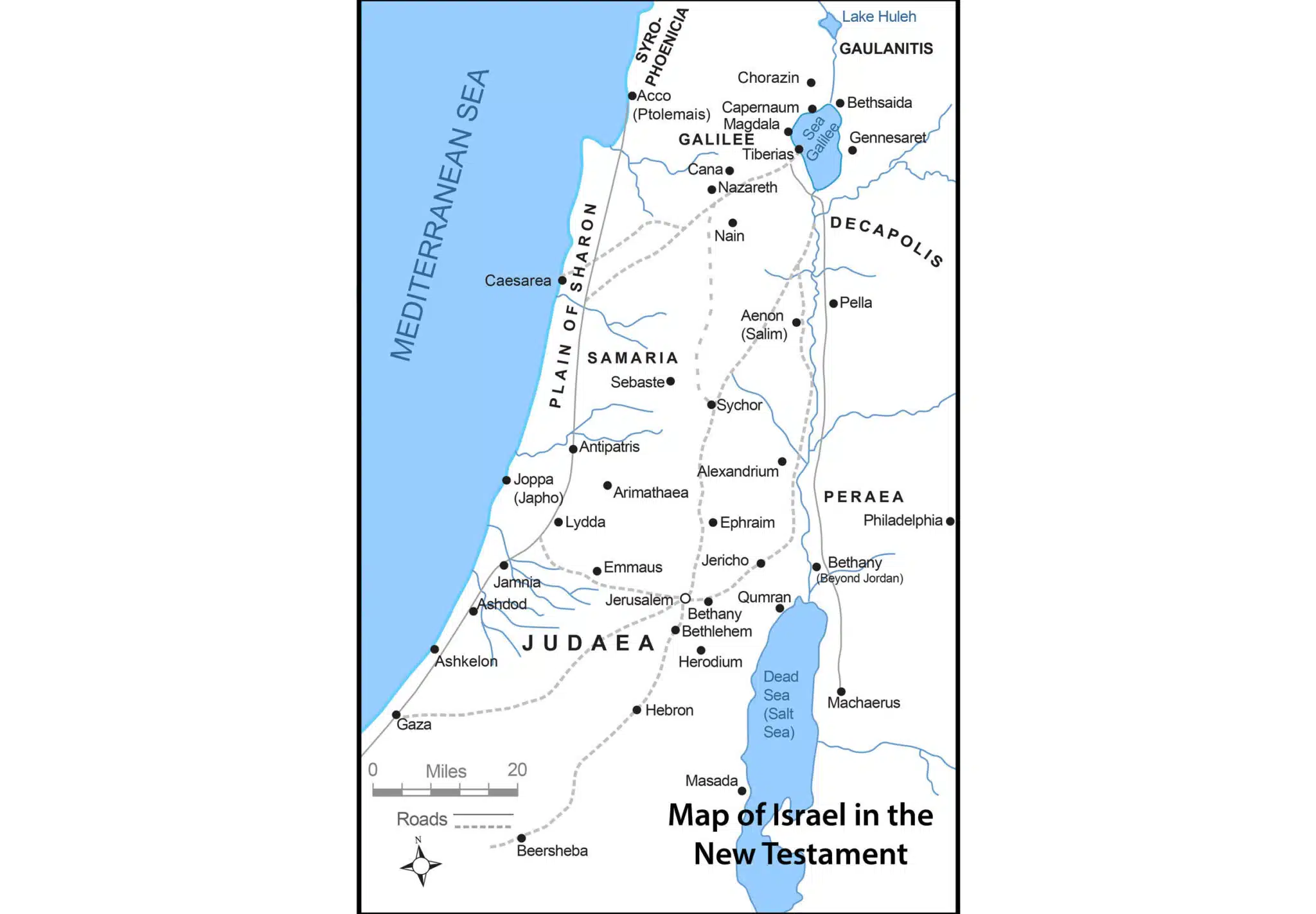Herod hears about the miracles of Jesus and incorrectly presumes that Jesus is John the Baptist returned to life.
The parallel gospel accounts of Matthew 14:1-2 are found in Mark 6:14-16 and Luke 9:7-9.
Matthew switches scenes in his narrative. His account moves from Nazareth where Jesus was unable to perform many miracles because of the people’s unbelief to a palace of Herod the tetrarch. Herod the tetrarch, or “Antipas” as he is sometimes called, was the son of Herod the Great, who sought to kill the Messiah when Jesus was a baby (Matthew 2:1-3; 2:16) and the brother of Archelaus, who was given reign over Judea when their father died (Matthew 2:22).
Unlike his father, Herod the tetrarch, was never officially granted the title of “king.” He was only nominally a king. But he was made tetrarch of Galilee and Perea by Caesar Augustus when his father died in 4 B.C. Tetrarch was a political position in the Roman political system. It means ruler over a “fourth part.” The regions that Herod the tetrarch had authority were the lands west of Galilee and Perea which was east of the lower half of the Jordan River extending to the northeastern mountains rising from the Dead Sea.
Herod the tetrarch had no official authority over the regions of Judea (and the capital city of Jerusalem on the western side of the Dead Sea); or Samaria (dividing Galilee from Judea between the Mediterranean Sea and Jordan River). The provinces Judea and Samaria were the jurisdictions of the Roman governor Pilate following Rome’s deposing of Archelaus in 18 B.C. Neither did Herod the tetrarch have official authority over the Decapolis (dividing Galilee from Perea on the southeastern shore of the sea of Galilee) or the region of Ituraea and Trachonitis (on the northeastern shore of Galilee). Ituraea and Trachonitis, sometimes called Gaulanitis, was the region ruled by Herod’s half-brother Philip (Luke 3:1). (But confusingly, this is not the same Philip who is discussed in this chapter.)
Matthew tells us at the same time that Jesus was in Nazareth, Herod the tetrarch heard reports about Jesus (v 1). News of public miracles Jesus had performed among the poor in and around Galilee had reached the palace of the regional authorities.
Herod seemed disturbed by these reports. And he told his servants, “This is John the Baptist: he has risen from the dead” (v 2). For reasons that will soon become apparent, it is interesting that Herod made these remarks to his servants and not his family.
Matthew has previously shown the prophetic and personal roles John the Baptist has served in the ministry and life of Jesus. John was the Messianic forerunner preaching the gospel of the kingdom preparing the way of the Lord (Matthew 3:1-6; 11:7-15). John was also Jesus’s cousin (Luke 1:35-36) and the one who baptized Him, inaugurating His earthly ministry (Matthew 3:13-17).
Recently Herod had John the Baptist beheaded as part of a grotesque bargain promised to his niece and her mother Herodias who was his lover and sister-in-law (Matthew 14:6-11). It appears that Herod executed John the Baptist reluctantly (Mark 6:20, 6:26). Perhaps he was feeling guilty or afraid when he heard about Jesus and the miraculous powers at work in him (v 2). In any case, Herod wrongfully assumed that Jesus was the prophet he just had murdered risen from the dead and more powerful than ever.
Biblical Text
1 At that time Herod the tetrarch heard the news about Jesus, 2 and said to his servants, “This is John the Baptist; he has risen from the dead, and that is why miraculous powers are at work in him.”
Check out our other commentaries:
-
Matthew 20:29-34 meaning
Jesus encounters two blind men at Jericho as He passes through the town on His way to Jerusalem. The blind men call Him the Son...... -
Haggai 1:7-11 meaning
The prophet Haggai asks the people of Judah to reconsider their attitude toward life and rebuild the temple so that God may restore their fortunes,...... -
Amos 4:1-3 meaning
Amos addresses the wives of the wealthy oppressors in Samaria and says that they will be pulled from the city either to captivity or to...... -
Joel 1:13–14 meaning
Joel addresses the priests, urging them to lament the disaster caused by the locust plague/invading army....... -
Daniel 1:8-13 meaning
Instead of eating the food of the Babylonians, which would be in violation of God’s law, Daniel trusts God and eats what He commanded. Because......





